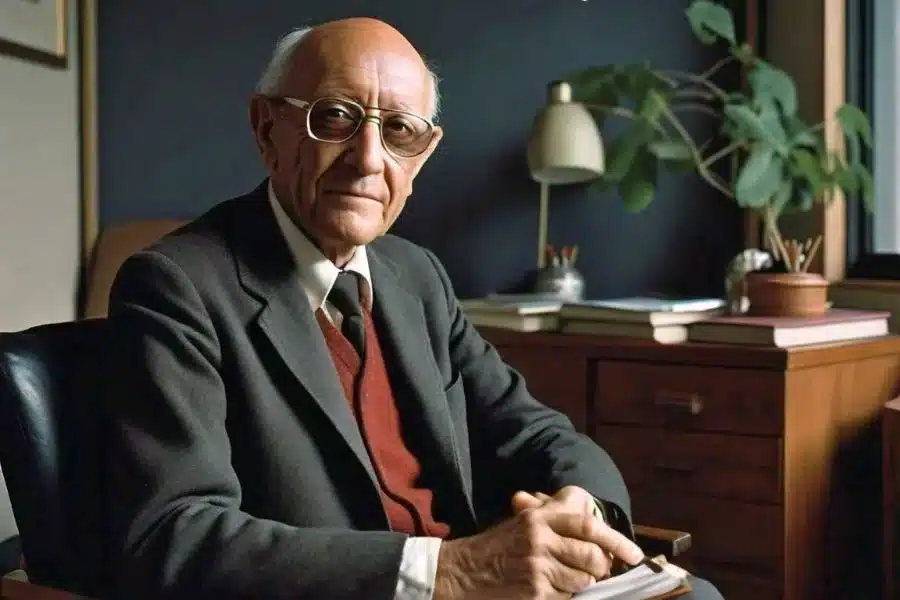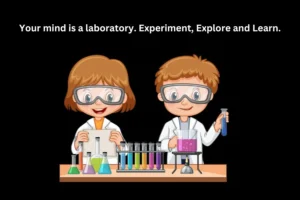Welcome to our blog devoted to the life and legacy of Carl Rogers, a highly influential psychologist in history. He is renowned for pioneering person-centered therapy focusing on empathy and understanding.
Carl Rogers humanistic theory had a long-lasting effect on humanistic psychology, altering how we contemplate psychological health. In this blog post, we shall probe into his biography and pathbreaking theories which molded modern psychology.
Additionally, we will uncover how his compassionate manner has evolved into the realm of humanistic psychology over time and its continual impact on society today. Please join us while investigating Carl Rogers’ uplifting tale!
Table of Contents
Carl Rogers Biography

Overview of Carl Rogers’s Life and Work
Born in 1902, Carl Rogers emerged as a prominent figure in psychology during the 20th century. His childhood was spent on a farm close to Oak Park, Illinois, after which he attended the University of Wisconsin-Madison, where his studies included religious education and psychological research.
In 1931 he earned his Ph.D. from this institution before taking up teaching positions at Ohio State University, wherein he delved into several concepts such as that surrounding client-centered therapy (or Carl Rogers Person Centered Approach). This therapeutic approach has come to be known for its association with him and is still popularly applied today.
Throughout the course of his career, Rogers had a considerable impact on the comprehension of personality development and interpersonal relations. He held that individuals possess an inherent drive towards self-actualization, which means their inner push for personal accomplishment and fulfilled life.
This innate capacity could be developed through open communication between therapist and patient without prejudice or expectation from both sides, eventually recognized as “unconditional positive regard” – a fundamental part of person-centered therapy (PCT).
Along with PCT, Carl Rogers created three other therapeutic approaches: encounter groups, non-directive therapy, and marriage/family counseling techniques.
Throughout his prolific career, Carl Rogers wrote extensively on psychological theory beginning with the publication of Counseling and Psychotherapy: Newer Concepts in Practice (1942), wherein he articulated many concepts associated with Person-Centered Therapy. His other influential works include Client-Centered Therapy (1951) and On Becoming A Person (1961).
Additionally, Freedom to Learn for the ’80s was released in 1983. It is estimated that more than 250 publications can be attributed to him during this lifetime – a remarkable feat for any psychologist!
Moreover, aside from continuing writing on psychology until shortly before his death at age 85 in 1987, Rogers also had an enduring effect on multiple spheres beyond psychology, such as education and business management practices, due to PCT’s focus on communication between different backgrounds or perspectives without judgment or criticism – something which could benefit all organizations regardless their size or purpose!
Carl Rogers Person-Centered Theory
Explanation of Carl Rogers Client Centered Therapy

Rogers was counted amongst the most eminent psychologists of the 20th century, and he is also renowned for being one of the foremost exponents of what has since come to be known as person-centered therapy. His sympathy-driven approach to psychology revolutionized this field.
At Columbia University, Rogers developed a person-centered approach centered around creating an atmosphere where clients would be heard without criticism or judgment.
Core beliefs, including the concept of self-actualization and the role of the therapist in providing unconditional positive regard and empathy
According to Roger’s core beliefs, all people possess the ability of self-actualization; they have within them the potential to reach their highest level if provided with a conducive and supportive environment.
Subsequently, Rogers supported therapists taking on the role of facilitators instead of directors, believing that showing unconditional positive regard for their patients was paramount while not attempting to impose any agenda upon them.
Congruence, Unconditional Positive Regard, and Empathy
Carl Rogers’ core belief that individuals possess the ability to find their answers through self-exploration led him to develop several key concepts, such as “unconditional positive regard,” “empathy,” and “congruence.”
These were ground-breaking ideas at the time since they focused on establishing an atmosphere of trust between therapist and client, which allowed for a greater understanding of the individual’s inner world.
Carl Rogers client centered therapy is highly regarded due to its focus on enabling people to pursue personal development without relying solely upon professional or outside sources’ interpretations.
Consequently, it allows people to gain deeper insight into their thoughts, feelings, behaviors, values , and beliefs in a safe environment free from critique or judgment.
As such, Carl Roger’s person-centered approach revolutionized psychotherapy by shifting away from conventional dictatorial approaches towards one emphasizing empathy, approval, and comprehension, emphasizing helping patients attain growth through self-exploration.
Carl Rogers Contribution to Psychology
Uncovering Carl Rogers legacy: Biographies, Books, and Documentaries
Rogers is regarded as a highly influential psychologist of the 20th century precisely due to his ground-breaking ideas concerning person-centered therapy. This approach places significant importance on empathy and understanding, diverging from conventional psychological methods.
Over the past few decades, his ideas have had an extensive impact on humanistic psychology, with him continuing to exist as one of its revered figures. Numerous accounts about Roger’s life have been recorded, ranging from biographies written by those near him to books that consider his influence and documentaries regarding his accomplishments throughout history and his inheritable legacy.
Consequently, gaining insight into Rogers’ heritage can be gratifying for someone who desires to learn about this remarkable character in modern-day psychology.
During his time at Teachers College of Columbia University, Rogers was exposed to various psychological theories but found them not up to the task when it came down to meeting human beings’ requirements while they worked towards achieving personal growth and development.
Therefore he created person-centered therapy (PCT), which accentuated mainly supplying an atmosphere where people could express their thoughts freely without trepidation or critique while being non-directive regarding counsel from the therapist.
Carl Rogers is known for promoting Unconditional Positive Regard (UPR), which involves demonstrating respect to the clients despite their actions or beliefs.
He also championed genuineness, better known as congruence, and this entails being straightforward with them even if it implies admitting mistakes; in addition, he advocated empathic understanding that necessitates therapists to assume a first-person viewpoint rather than take on an aloof outlook. These three fundamental core concepts are collectively referred to as “The Three Cs”:
Congruence/Genuineness, Empathy, and Unconditional Positive Regard – integral elements of Person-Centered Therapy today. To acquire additional information on the life story of Rogers and the lasting impact it has had on modern psychology, one can explore numerous biographies, books, documentaries, and podcasts that are solely devoted to him.
Additionally, attending lectures given by experts in Person-Centered Therapy (PCT) can offer valuable perspectives on how this revolutionary approach has shaped our understanding of psychological treatment, highlighting its continued relevance despite the evolution of time.
Contributions to the Understanding of Self-Actualization

Carl Roger is remembered as an exceptionally influential psychologist and psychotherapist owing to his pioneering of the humanistic approach to psychology. His work revolved around gaining knowledge concerning self-actualization so that people can reach their full potential by being provided with a judgment-free atmosphere that supports them.
Self-actualization stands for comprehending one’s strengths and weaknesses along with needs or desires; all these insights were brought forward via person-centered therapy (PCT), further popularizing the contemporary humanistic approach towards psychology.
Roger’s theories were based on three primary ideas:
- Congruence (genuineness)
- Unconditional positive regard (nonjudgmental acceptance)
- Empathy (seeing things from another person’s viewpoint)
Emphasizing the need for a therapist to provide sincere assistance to their client without conditions of worth, these principles also illustrate that by listening carefully with an open attitude, it is possible to gain insight into the patient’s mind. This therapeutic relationship enables individuals to delve deeper into self-actualization since they can freely explore themselves without fear or dishonor.
Furthermore, Carl Rogers’ influence on humanistic psychology has been long-lasting due to his development of the concept of client-centered learning. This approach encourages personal growth through experiential education rather than traditional lectures or lecture-and-exercise combinations usually found in universities.
He believed that establishing trusting relationships between teachers and students would result in improved educational outcomes and heightened student motivation levels, given its emphasis on customized instruction according to each individual’s specific needs and interests.
Carl Rogers’ Humanistic Theory

Carl Rogers has been distinguished as one of the most renowned figures in humanistic psychology for a prolonged period. His pioneering effort and person-centered strategy to therapy revolutionized the field substantially, with his theories still widely employed today.
At the time of his work with those struggling with depression and anxiety, Carl Rogers formulated a person-centered approach to therapy. This style was revolutionary for its period because it involved listening without judgment or offering advice to comprehend how clients felt.
One crucial element which Carl Rogers added to humanistic psychology was “the actualizing tendency” (a concept he coined) or “self-actuation principle,” implying that every individual has an innate capacity for growth, self-fulfillment and becoming fully functioning person.
This theory postulates that humans have an innate inclination to reach their utmost human potential and achieve internal serenity despite any adversity they may encounter throughout life, thus signifying a desire for self-actualization.
Rogers postulated that unconditional positive regard was necessary for nourishing psychological health; this implies accepting someone without any reservations, regardless of potential flaws or predicaments they may endure, and not passing judgment on them nor trying to modify their identity into something other than what it is. Instead, it encompasses loving acceptance unconditionally so that person can progress with poise knowing somebody else treasures who they are despite whatever imperfections they might feel in juxtaposition to those around them.
Furthermore, Carl Rogers wrote extensively about empathy as an additional significant factor when providing effective counseling services. His view of empathy encompassed the ability to put oneself in another person’s shoes and comprehend how events look through their perspective; this helps them identify solutions accordingly. These writings on empathy significantly influenced psychotherapy into what it is today – focusing on client-centered approaches rather than heavily concentrating diagnosis and treatment plans based on experts’ views.
Cumulatively, his work has been essential for modern-day psychiatry practices that we know now. By incorporating principles such as the self-actualization principle, existential living, unconditional positive regard, and particularly sympathy into guidance sessions, he created a joyful environment enabling those involved to express themselves without fear or apprehension from others – still applicable even after generations since Roger’s death passed away.
Impact and Legacy
Carl Rogers Influence on Modern Psychotherapy Techniques
Carl Rogers’ approach to psychotherapy was revolutionary for its period because it placed a significant emphasis on the individual’s inner experience rather than simply their behavior or external symptoms. He contended that valid healing could only come when people could interact with their thoughts and emotions without judgment or conditions of worth from outside sources like therapists or family members.
Carl Rogers’ theory is fundamentally rooted in unconditional positive regard, a method emphasizing respect for people as they are with whatever imperfections they may possess and encouraging them to confront any truths that may be challenging. To accomplish this goal, Roger employed active listening techniques like open-ended questions, attentive silence, and mirroring statements back at clients while summarizing them without judgment or analysis – all done so the client could feel comfortable enough to take risks disclosing their feelings.
This idea finds significant resonance among many modern psychotherapists, who continue to employ his techniques while introducing mindfulness meditation and cognitive behavioral therapy (CBT) elements into their practice.
His legacy has been extended beyond clinical settings into leadership development strategies such as coaching programs that use analogous approaches in working with employees or teams within organizations. His impact is further reflected by the Carl Ransom Rogers Award, instituted by the American Psychological Association (APA) in 1980 and granted annually since then; it stands for recognizing “significant contributions to advancing humanistic principles through research findings.” It, therefore, goes without saying that Carl Rogers leaves an undeniable stamp on current psychotherapy methods – one set to influence successive generations for years ahead.
Personal Growth and Self-Exploration

Rogers formulated his theories based on the assumption that each individual has potential they can actualize. He held firm conviction that if individuals could interact with their true selves, they would be able to realize higher levels of human-beingness.
To facilitate this process, he created three fundamental conditions: Congruence (authenticity), Unconditional Positive Regard (acceptance), and Empathy (understanding). By establishing these conditions in the therapeutic relationship, Rogers intended to give individuals a secure environment where they could feel sufficiently comfortable to investigate their thoughts and emotions without fear or criticism.
Rogers’ emphasis on comprehending persons inspired him to create numerous theories still employed today in counseling sessions. One such theory is Self-Theory or Self-Concept Theory, which claims that how an individual perceives themselves affects their behavior and how others perceive them.
This notion has been extensively utilized by therapists when working with those who have difficulties concerning low self-worth, self-esteem or issues regarding body image and self-image because it assists them in understanding how their way of thinking about themselves shapes their reality.
Furthermore, Carl Rogers formulated a popular theory named client-centered therapy. It focuses on permitting the clients to take charge of their healing journey by examining various options accessible without any intervention from therapists inquiring queries or proffering counsel unless explicitly requested by the customer.
This method emphasizes giving patients freedom while providing direction if necessary so that they do not feel overwhelmed while evaluating various treatments. It has proven very effective in helping people recover from traumas more quickly than conventional procedures and enabling people with mental health issues like depression and anxiety to identify alternative healthier coping mechanisms.
Building Meaningful Connections

The Importance of Empathy in Therapy
Carl Rogers was a ubiquitous figure in psychology who left an irreplaceable impact on the profession, and his person-centered approach frequently serves as a fundamental principle for present-day humanistic psychotherapy. One of the essential components of Rogers’s mentality was his concentration on empathy as an indispensable factor for effectual therapeutic relations. Rogers held that empathy is so vital to therapy that it ought to be reckoned one among three quintessential conditions imperative for healing.
Carl Rogers posited that empathy is an intricate concept involving “an accurate and deep understanding of another person’s inner experience.” It entails cognitive and emotional elements; from a cognitive viewpoint, it necessitates that empathetic therapists be able to discern their clients’ emotions without making any value judgments or evaluations.
Moreover, the compassionate therapist must not merely comprehend these feelings intellectually but also react emotionally to reflect openness, warmth, acceptance, curiosity, and caringness.
Empathy is undeniably essential to the success of therapy due to its ability to cultivate an atmosphere where clients are comfortable enough to freely express their innermost thoughts and feelings without dread or criticism from their therapist. Through this, individuals can delve more deeply into troublesome sentiments and experiences while experiencing strengthened support during the therapeutic journey.
A therapist who exhibits genuine empathy communicates nonverbal messages, such as intently looking at someone with a compassionate face and body language, which reveals comprehension of what one may be going through – allowing patients to feel less isolated when dealing with life’s challenges while simultaneously inspiring greater self-knowledge along with personal development over time.
Besides engendering unconditional approval within healing relationships, research has evidenced how even brief periods of empathic therapy can lead to beneficially impacting psychological outcomes like:
- Enhanced state of mind
- Increased confidence
- Augmented motivation levels
- Diminished anxiety levels
- Upgraded skills for communication
- Amplified understanding concerning problems faced by people daily
- Heightened resilience amid trying moments or traumas happening in life
- Better capacity for problem-solving
- Improved physical health results including reduced pain among those suffering from constant agony
- Physiological changes like lower heart rate variability amongst young adults facing risks.
How His Ideas Have Been Interpreted Today
Carl Rogers has established himself as one of the most influential figures in psychology, pioneering person-centered therapy. He developed ground-breaking theories on humanistic psychology and revolutionized approaches to grasping individuals’ complexities. Rooted in his belief that all humans are fundamentally good, he sought to create an environment where people could consider their feelings without anxiety concerning judgment or censure.
Rogers concentrated heavily upon self-actualization – a term he coined to denote the procedure whereby individuals strive towards achieving their most excellent possibility.” He posited that when individuals are provided with unconditional positive regard, they can achieve more significant development and reach their goals. This idea has been widely accepted today, as many therapists employ this concept in their treatment of patients. Moreover, his research introduced an important notion known as ‘unconditional positive regard’ (UPR).
Unconditional Positive Regard (UPR) is a concept that has become increasingly prominent within mental health therapy. It involves an approach in which therapists accept their clients without judgment or prejudice towards them, regardless of their behavior and beliefs. This notion is premised on the idea that individuals require unconditional acceptance if they are to have trust sufficient enough to openly divulge what transpires internally and authentically express how these thoughts and feelings manifest themselves externally.
As such, UPR has been integrated into various contemporary forms of psychological treatment as it facilitates more profound connections between therapist-client dyads while supplying adequate opportunities for personal expansion in this process.
Carl Rogers contributed significantly to exploring how relationships can significantly affect our overall well-being. He valued empathy as a primary factor during therapy sessions, believing that forming genuine connections could facilitate healing and growth for the individuals involved.
These therapies include Transactional Analysis (TA), Emotionally Focused Therapy (EFT), Dialectical Behaviour Therapy (DBT), Acceptance & Commitment Therapy (ACT), and Mindfulness-Based Cognitive Behavioural Therapy (MBCBT). As a result, his beliefs have been incorporated into several therapies. These approaches are not limited to understanding our inner world but also promote connecting with other people through showing empathy, compassion, acceptance, validation, and love – something Carl Rogers strongly encouraged throughout his lifetime.
Conclusion
In conclusion, Carl Rogers was a crucial contributor to the field of psychology who established person-centered therapy and had an eternal effect on humanistic psychology. His empathetic technique for comprehending persons revolutionized the discipline of psychology. It assisted in forming how we consider mental well-being presently. His efforts are still being analyzed and deliberated in classrooms across the globe, making him one of the noteworthy personalities in modern-day psychology.













